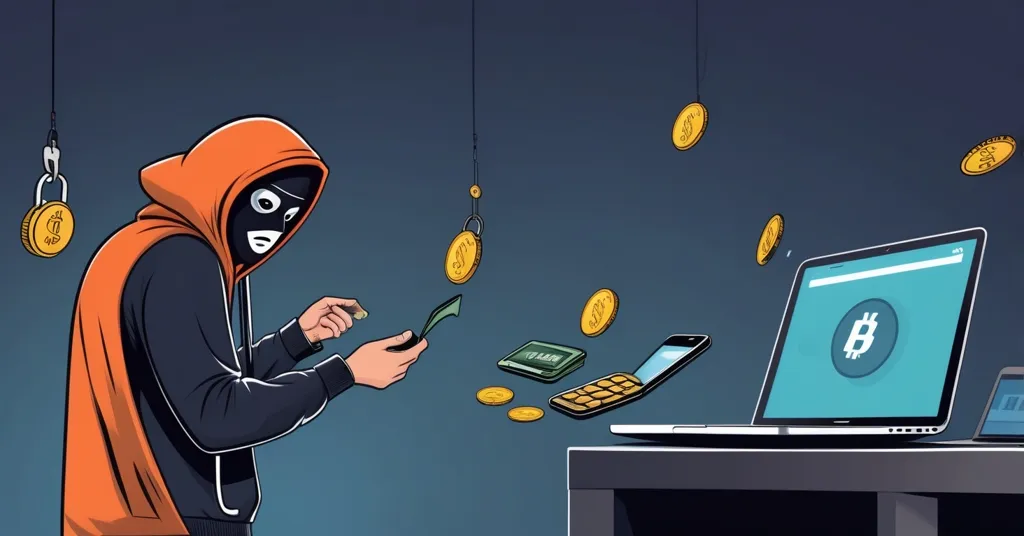zkLend Hacker Claims Phishing Scam Loss: 3,667 ETH Stolen Funds Vanish

zkLend Thief Claims to Be Robbed: A Twist in the Tale of Stolen Crypto
The hacker who stole 3,667 ETH from the zkLend lending platform in mid-February now claims to have been scammed themselves, adding a bizarre twist to the saga of stolen cryptocurrency. The perpetrator points fingers at a phishing site, leaving the crypto community both amused and skeptical.
- zkLend hacked in mid-February, 3,667 ETH stolen
- Hacker claims to have lost funds to phishing site
- zkLend skeptical, no funds returned
zkLend, a decentralized lending platform in the DeFi (Decentralized Finance) space, was hit hard when a hacker made off with 3,667 ETH, valued at around $9.5 million at the time of the theft. DeFi refers to financial services built on blockchain technology, offering a decentralized alternative to traditional finance. In an attempt to recover the funds, zkLend offered a 10% bounty, but the hacker remained silent until recently.
On March 31, the hacker broke their silence with a public message on the blockchain that read like a plot twist in a crypto thriller. They claimed to have fallen victim to a phishing website that imitated Tornado Cash, a well-known privacy-focused cryptocurrency mixer used to enhance transaction privacy. The hacker’s message was filled with regret and a plea for zkLend to redirect their recovery efforts:
Hello I tried to move funds to tornado but I used a phishing website and all the funds have been lost. I am devastated. I am terribly sorry for all the havoc and losses caused. All the 2930 eth have been taken by that site owners. I do not have coins. Please redirect your efforts towards those site owners to see if you can recover some of the money. I am sorry.
zkLend, however, remains unconvinced. They pointed out that the phishing site in question has been operational for five years and is likely unrelated to the hacker. Phishing scams in the crypto world are akin to fake bank websites that steal your login details, but instead, they target cryptocurrency users to steal their digital assets. Despite the hacker’s claim, zkLend has urged them to return any remaining funds, but no such transfer has occurred.
The crypto community is abuzz with speculation. Some believe the hacker’s story might be a ruse to obscure the stolen funds, while others wonder if it’s an elaborate April Fools’ prank. In the world of crypto, it seems even thieves aren’t safe from getting robbed. The incident sheds light on the complex web of security threats in the DeFi world, where even hackers can become victims of their own game.
This saga underscores the ongoing risks and challenges in the cryptocurrency space. As DeFi platforms continue to grow, with over $55 billion in total value locked as of October 2022, the need for robust security measures becomes ever more critical. The zkLend hack and the subsequent phishing claim highlight the multifaceted nature of security threats, from initial thefts to secondary scams.
While the hacker’s claim adds a layer of irony to the story, it also serves as a reminder of the importance of vigilance in the crypto world. Whether the hacker’s story is true or not, the incident emphasizes the need for DeFi platforms to implement rigorous audits, multi-signature wallets, and user education to mitigate such risks. Multi-signature wallets require multiple signatures to authorize a transaction, adding an extra layer of security, while audits help identify vulnerabilities in the platform’s code.
The individual behind the zkLend exploit may have a history of similar attacks, including the EraLend hack in July 2023, which resulted in a loss of approximately $2.76 million. This context suggests a pattern of behavior that could inform future security measures.
Experts like Web3 Hunter have suggested that hackers often feign being hacked themselves to divert attention or for tax reasons, adding a layer of skepticism to the hacker’s claim about the phishing site. Another user, DirectorV, speculated that the hacker might control both wallets involved in the transaction, suggesting a possible cover-up.
The prevalence of phishing scams in the crypto space, including fake Google ads and emails, underscores the need for users to be cautious. Using well-known and audited decentralized applications (dApps), employing multiple wallets, and considering DeFi insurance are practical steps users can take to protect their assets.
Key Takeaways and Questions
- What happened to the funds stolen from zkLend?
The hacker claimed to have lost the funds to a phishing website that imitates Tornado Cash.
- How did zkLend respond to the hacker’s message?
zkLend instructed the hacker to return any remaining funds, but no such transfer has occurred.
- Is the hacker’s claim about the phishing site believable?
There is skepticism about the claim, with experts suggesting it might be a cover-up or a tactic to divert attention. zkLend has found no conclusive evidence linking the phishing site to the hacker.
- What are the implications of this incident for the security of DeFi platforms?
The incident highlights the ongoing risks and complexities of security in DeFi, emphasizing the need for robust security measures and awareness of secondary scams.
- What steps can DeFi platforms take to mitigate such risks?
DeFi platforms can enhance security through rigorous audits, implementing multi-signature wallets, and educating users about the risks of phishing and other scams.



